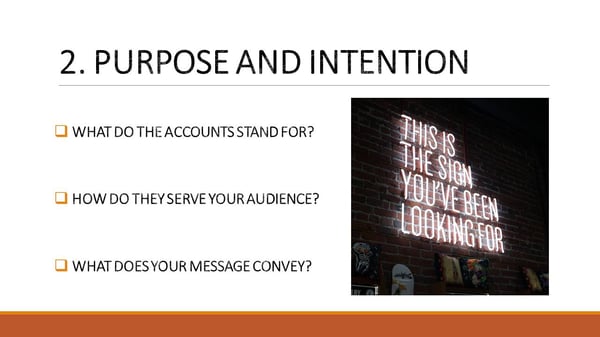Social Media Marketing Strategy
- Home
- Social Media Marketing Strategy
My name is Ketna Mistry. I'm a Social Media strategist. Now there are some parallels that we can draw from everything that we've just heard to what Social Media is all about. I am going to speak to you about Social Media strategy.
What I do is enable organisations, from small start-ups to large Fortune 500 companies to operate effectively on Social Media. I have worked across the B2B and B2C sectors so I will be able to relate to every single one of you in this room.

Now I guess what I'm going to be speaking to you today about what makes up a strong Social Media strategy. So that's not to be confused with Social Media marketing because the two are very different, but there are components of Social Media marketing and I'm just going to be able to help you look at what a sustainable model looks like for you to carry out your Social Media marketing.
- How many of your businesses have a Social Media presence?
- How many of you have a plan?
Okay. Right, so that's the thing that I want to talk to you about. It is effectively a plan. Now what makes up a strong Social Media strategy is if you think about it, there are lots of things that are involved with what's incorporated within a Social Media strategy. You have to start thinking about well…
- What do you need?
- What is it that you have internally?
Because that's what's going to be reflected externally and so I'm going to move on to this, which is the 7.5 billion people in this world. Half of them are on the Internet. One-third of that 7.5 billion are on Social Media. What does that mean for businesses?
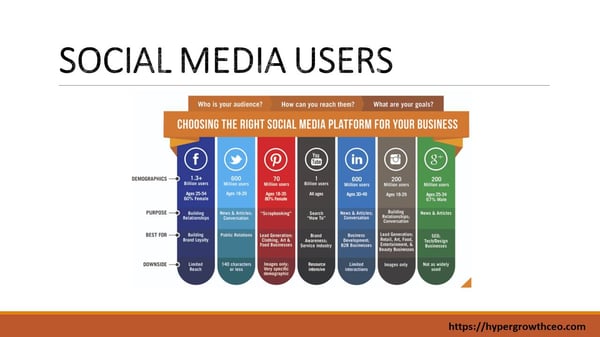
That means that in 2019 marketers are expected to generate $39 billion in revenue just on Social Media alone. No other platform. So there's a lot and I'm sure that everyone sitting is paying attention and they're like, YES, I want a piece of that pie. So, what does that now mean?
Now before I go into the strategy, I want to talk to you about the myths and mistakes that I made out there. Social Media needs demystifying. It's not a broadcasting platform. It isn't. It's not a way for you to just use it as a content repository for all the content and just go, blur, all over your audiences.
You do not need to be on every single platform. Do two or three well, rather than trying to spread yourself too thinly, especially for those of you that are struggling for resources.
Focus on your performance metrics, not on your vanity metrics, like a high number of followers or you've got great engagement.
- What does that mean?
- What does that affect?
- How is that affecting your business?
"Failing to plan is planning to fail"
Social Media is not free. Your brand reputation is at stake. Moving on to the mistakes, failing to plan is planning to fail. Without listening to your audiences, hearing about what they have to say about you, whatever they are talking about you, what they're saying about your industry or how they're even engaging with you.
So start to think about what they have to do and also be human. Spoiler alert, they know that there's a human operating your Social Media accounts and then finally posting the same content. Now if you think about how Social Media platforms are set up, you don't use them in the same way.
Think about how you use Facebook Linkedin or Twitter. You use them for different purposes. So why are you then taking that same piece of content and then just distributing it using whatever management platform you have across those three different platforms?
It just doesn't make any sense because you're all using those platforms for different purposes. So it has to be tailored to that platform.
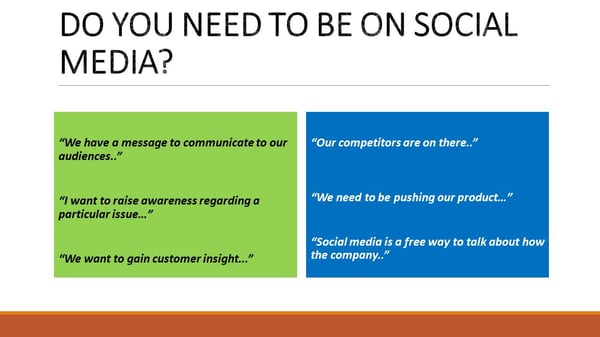
Now this is a very controversial question, especially as I've just explained to you that there's $39 billion to be made. So, if your reasons for being on Social Media are the ones that are in green, that's great. You understand why you need to be on Social Media.
But if they're the ones that are in blue because your business has a serious case of Fomo or they are just using it for a sales product, then that's not the reason why you want to be on Social Media.
You need to revisit why. You need to understand why it is that you need to be on Social Media because that affects everything that you're going to do. It needs to be backed up with information and intent.
“Because the other thing I'd like to sort of say on that is Social Media is not a magic bullet”
It's not going to fix your business, it will highlight the problems that you have. So that's something to bear in mind when you're starting to work on your Social Media plan.
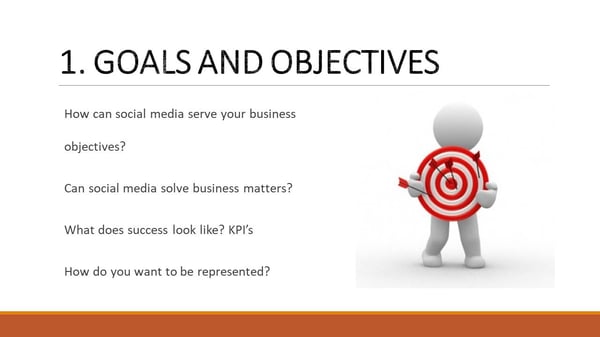
Number one
Start aligning your goals and your objectives. This is what I mean about drawing parallels to what you're doing on PR and everything else because you need to be able to break down how Social Media is going to solve your business needs.
So think about what are your business objectives. Now start to align what that means to Social Media. How is Social Media going to solve whatever you're trying to solve?
Once you have that aligned, you can then start to think about your KPIs.
How is this going to be measured?
So again, start thinking about those performance metrics. Start thinking about what that means to everything that you have to have in place. What's going to make your business or your CEO sit up and pay attention and start to consider Social Media to be a credible tool for you to use within your mix?
Then finally, when you're thinking about your goals and objectives don't forget your audiences. One of my favourite quotes is:
“What is a Social Media strategist strategy is remembering your goals whilst respecting your audiences”
So what? How does your brand want to be perceived on Social Media by your audiences? And that's what you always have to have in mind. So always bring it back to the customer.
You have your goals and your objectives for your company, so whether they are your business goals, your marketing goals, whatever they may be, this is how Social Media is going to deliver that and this is then the business impact of what it is that you're going to be able to deliver.
So try to monetise as much as you possibly can. And it's not necessarily just what you're generating, it could be that you're saving money for the business. So if you are, try to put that into terms that your business will then start to understand.
Now purpose and intention is definitely one of the key things that you need to have. So if you think about your goals, you're going to have your goals, but then:
- Why does every single one of your platforms exist in the first place?
- What is the intention behind it?
Do this exercise by answering these questions for whether it's your Facebook account, whether it's your Linkedin, your Twitter, you need to understand why they exist and then your business needs to understand why they exist because if your business doesn't understand, then they're not ever going to be able to help you to take this forward.
The Importance of Governance in a Social Media Strategy
Okay. Social Media, the governance piece on this is like visiting the dentist. No one ever wants to go, but you know you need to, it's necessary. Well, governance, no matter which industry you're in, no matter whether you're B2B, or B2C applies to everyone. It's so important. I find this one of the least spoken-about areas yet one of the most important.
- Do an audit.
- Understand your landscape.
- Understand the marketplace in which you're working within.
- Carry out and put some policies in place.
- You need to understand what your employees need to understand.
- The parameters in which they can operate within.
It doesn't need to be complicated. It just needs to be in simple English so that everyone adopts this and it needs to be no more than two or three pages long, but all people are looking for are the do's and don'ts of Social Media so that they can fully understand how this works.
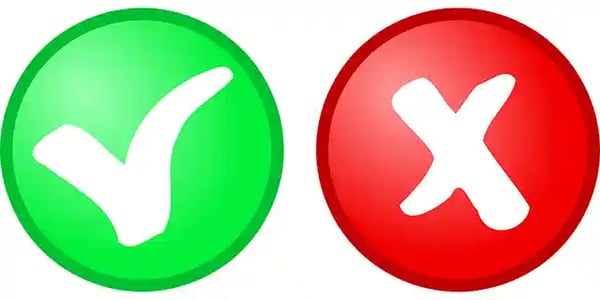
Guidelines need to be in place for you to have your professional persona delivered. So you have this level of consistency. Your business has a level of consistency no matter who is operating that Social Media account. Your training and education, now that's an interesting one because you need to bring every one of your employees on the same viewing pane as you.
They need to understand and see Social Media exactly how you do and the only way you're going to do that is through training and education and then finally identifying processes. Now I'm not saying go process crazy, but it's designed and it's there because you want to design this to alleviate pressure.
So start to think about where you spend most of your time. Where are you sort of troubleshooting the most? What are you doing? That's where you need to start to implement processes to reduce some of that pressure.
What are the benefits of monitoring or even just carrying out some basic research or listening? You understand what people are saying about your brand. You understand what people are saying within your industry. You know who your influencers are, and who your brand ambassadors are.
You can potentially even find some great user-generated content. There's so much that you could do. There's also crisis management, so if you don't already have a crisis management process in place, your social listening should be incorporated as part of that.
So there's lots to be done, a lot of this is around discovery. You want to be able to understand where your audiences are and then how can you start to have that feed through into your activity?
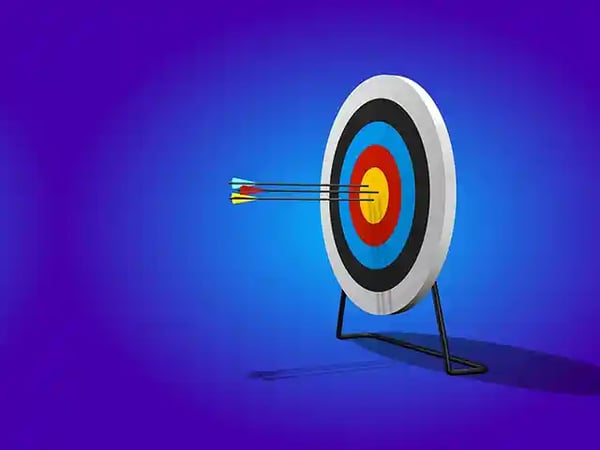
Target audience, this is an interesting one because not many people know who their target audience is on Social Media you want to know who are your audiences and what are they doing.
You're almost sort of like pre-empting this, what action do you then want them to take? Start by looking at your existing community. All of the social platforms have some great insight into what you can deliver. What you need to do is understand well, is my target audience.
“Who I expect them to be?”
Because they might not be. So then you need to understand what that gap is between the two so that you can really sort of take that forward. And so you want to be able to understand:
- Through like discovery,
- Look up certain topics,
- Look at the industry to terms of finding out where your target audience resides,
- What platforms are they on,
- Which groups are they in,
- Which influencers are they following?
So all of this stuff is going to then help you understand how you can create, and tailor your content to target this audience. Now, here are some motivations behind why people follow brands. Think of your own. Think of why you follow social brands on Social Media.
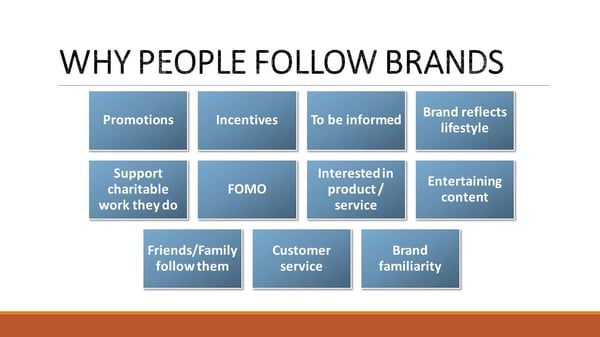
They are most likely to fit into one of these buckets. Understanding this allows you to then create content around how you're going to frame your content to be able to deliver good quality content to target your audience. Your audiences will then feel nurtured as part of that.
This is content specifically for Social Media. This is your funnel. Now you need to create content as part of it.
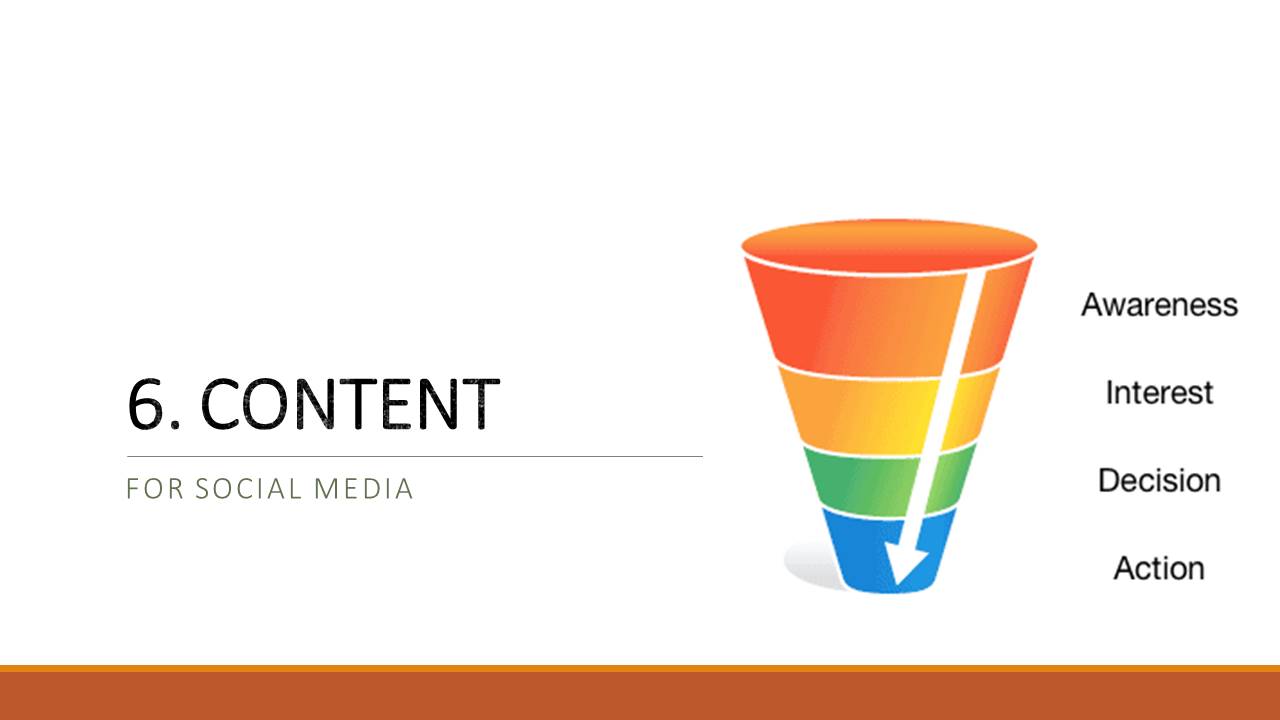
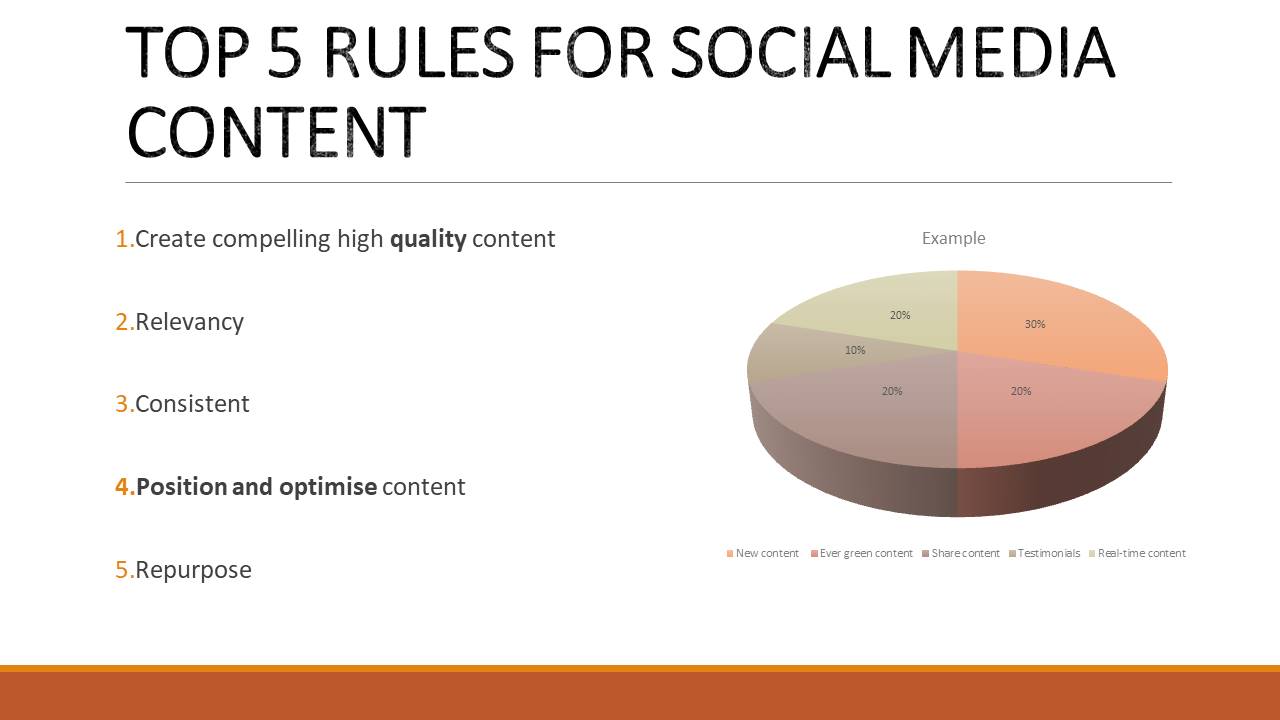
This funnel, I'm sure many of you have seen this before, but you need to and your audiences need to be aware of you. They need to express interest, they need to explore you and then they're going to decide through your content whether to take action.
Now you need to create content and you need to plan your content to fit into every single stage of this funnel. Here are my top five rules for Social Media.
Content is the backbone of Social Media. So it needs to be good. It has to be no matter what you produce, whether it's blogs, videos, images, or whatever it may be, it has to be exceptional.
What I mean by relevancy is we've just finished hearing about the way that newsrooms work.
Relevancy in this aspect is it works the same way. You have to be able to put out relevant content. If you think about how newsrooms work, what they do is that even if a journalist has been working on a great piece of content, the editor will say, no, this is no longer relevant. A better story has come in.
So relevancy works in the same way in that you need to be on time with your audiences because pushing out a piece of content 24 hours later, well...the story's gone, so your readership is gone. So think of it that way. Consistency is I guess the best way I can describe this is if I fed myself a week's worth of food on a Sunday and then starved myself until Saturday.
Is that enough? Does that work? It's not. Social Media is the same way.
This is what I see time and time again with accounts where they overload their audiences with content and then they just starve them for ages. So for you to have it healthy online presence, you need to be consistent. Your images and your videos, whatever you are creating, any form of assets need to be the same.
They need to have that recognition with your audiences almost immediately when they see your content, they're like, right, I understand that this is from this brand. I completely get it.
So you're almost subconsciously trying to sort of engage with them and I'm sure we're going to hear that later on in the neuroscience talk.
Then when I'm talking about position and optimising your content, think of keywords and hashtags. So if any of your companies have produced a content piece on Brexit, how am I going to position that?

So depending on what I'm saying about Brexit, because it's a large topic, I have to understand well if is it going to be about trade. Is it going to be about government? Is it going to be about the economy?
I then need to find the keywords that are associated with that and I need to incorporate that within my message. That's what's going to differentiate you from everyone else because Social Media is a breeding ground, for effective messages. So your content needs to stand out and this is how it's going to do that. And finally, re-purposing your content.
Everyone knows that I'm sure every single one of you consumes content differently. Some people have preferences for videos others prefer reading it and absorbing it and some people just like it in bite-size chunks. But if you have just spent the last two weeks on creating a great video, that's it. It kind of ends there once the video has gone out.
Whereas you could take that video, you could turn it into smaller videos. You could write it up as a blog piece. You could turn them into images, you could do so much with it. So re-purpose it within an inch of its life to get the most out of it. You want to squeeze it.
“Paid is only effective if you know who your target audience is”
Okay, we've just heard about the owned and paid model that is specifically for Social Media. Owned is necessary. It's necessary when people are looking and researching your brand. So if they've just come across your brand, what's the first thing they're going to do? They're going to check you out. They're going to understand who you are.
- Are you who you say you are?
- What kind of content do you have on there?
So it's going back to those motivations because they could be interested. Now paid is only effective if you know who your target audience is. It's an expensive tool to use otherwise.
So don't throw your money away on just trying to do broad advertising thinking it's a pay-to-play model because you can just still need to understand who it is that you're trying to target. Earned is optimal.
You want earned to be the biggest slice, within this pie because earned... Everyone understands that a recommendation or an endorsement from someone is:
- So much more powerful,
- It's more trusted,
- It's more credible,
- It's more authoritative than any form of advertising your brand will ever do.
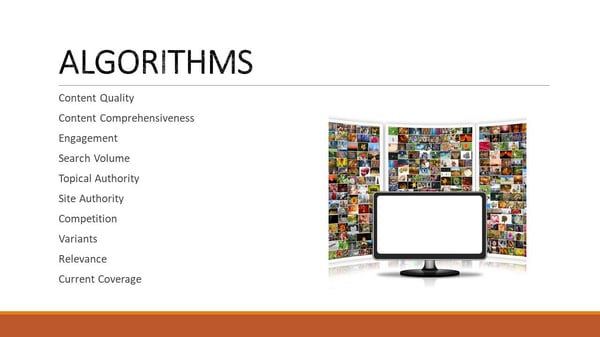
I looked up the various algorithms you could find when you're trying to create content and it's a minefield. I've tried to capture them here, but if you spent all of your time trying to produce content to meet every single one of those criteria, your content will never leave your desk.
It just would never really, it would go anywhere. So what I'm saying is to create quality content that is relevant and timely. So you want to get the right message to the right audiences at the right time.
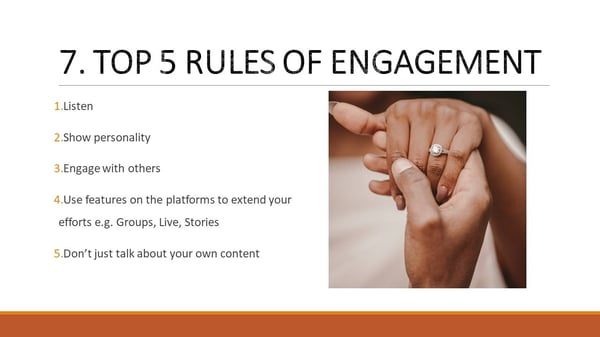
Okay, so not this type of engagement, but engagement on Social Media. Observe your audiences, their behaviour, and what they're doing so that you can start to pick up patterns and trends.
Be human because no one likes to engage with a corporate robot because it's just not something you want to do. Converse with your audiences, if they are talking to you, if they are leaving comments on your content, whatever they're doing, interact with it. As in, there's nothing to stop you from doing that.
Don't be afraid because they are looking for answers. Now, platforms have spent a fortune to create various features and the reason that they have done that is because they're encouraging and they are trying to optimise engagement. So if you think about groups, why do they exist?
“Facebook stories and Instagram stories are huge”
Because people prefer to speak in smaller forums about a subset and subject. Facebook stories and Instagram stories are huge. There are 400 million people who use Instagram stories daily. So how can you leverage that to create engagement?
All of these things exist for exactly that. So try to incorporate that when you're thinking about engaging with your audiences and then finally don't be that account that just sits there. Just throwing out content about themselves rather than trying to understand industry matters.
Otherwise, you just look like you don't understand anything about what's going on in the industry and you're just there to talk and promote yourselves.
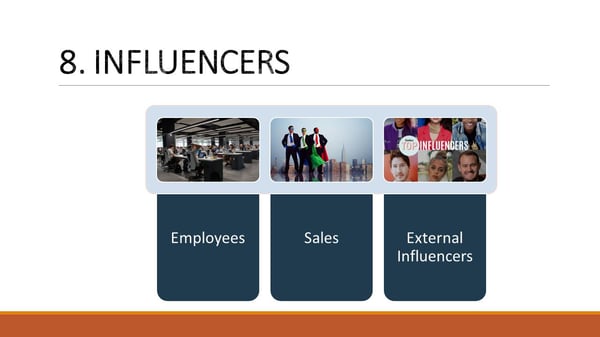
Now there are many forms of influences. , I would sort of bucket them depending on your goals. So if we go back to your goals and your objectives or whatever the intention is for what you're trying to do on Social Media, can you activate your employees because that's what all of these things are?
Have a look at how you can do that. Have a look at how you can incorporate external influences. You don't have to, you can choose one or all of these. The reason why influencers exist is because they're looking for credible, trustworthy advice from their peers.
There's lots of research that's been carried out, whether it's been by Nielsen Adweek, one of them is 76% of people have said that they trust content from normal people. I don't know what normal people are, but they trust content from normal people rather than brands.
That's why people engage with influencers. But then normal people can be your employees, they can be your salespeople. So all of these things need to sort of start to be considered, but ultimately what you're trying to do with influencers is gain credible trust.
No, I've listed out some technology, but firstly, what you need to start to do is evaluate the technology that you need to have in place. So going back to your goals, what do you need to accomplish and how does your technology facilitate that? You do need a lot of these tools for you to do any form of Social Media and again, this all comes back to what you're trying to accomplish.
One thing I will add to this is that, think about your resources as well. So if you have ambitious business goals and ambitious Social Media goals, well, how are you going to fulfil those?
- Will one person be enough?
- Or do you need help?
- Do you need support?
So maybe you kind of need to speak to some of your agencies or specialists for you to get that help, if you don't have that in-house. What gets measured, gets managed. You cannot do any form of activity without trying to measure.
So benchmark all of your metrics. Think of everything, every single metric that you want to measure, and then start to benchmark it. So go back, look back in history to understand your previous engagement, performance metrics, whatever that might be.
You need to start to understand what you're trying to accomplish. You'll never understand that by just industry benchmarks. You need to understand your benchmarks. Everything you're trying to do is going to give you insight so that you can get better at what you're trying to accomplish.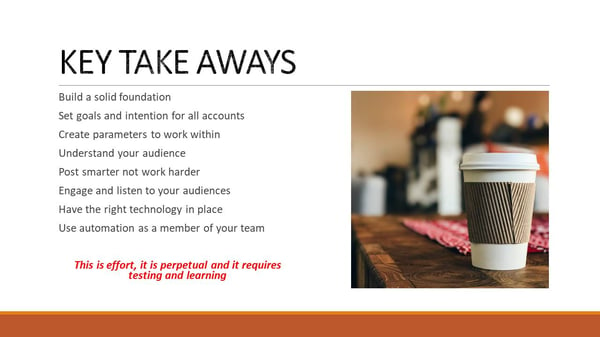
My final note, you need to have a goal. I cannot stress that enough. You do need to have purpose and intention, create parameters for your audience, and for your employees to be able to operate within because that's going to be the key thing for you to scale what you're going to do.
Because what you are looking to do is scale quickly and effectively. That's all you're trying to accomplish here by having a plan because without having a plan, you're unable to take that forward.
So if you think about a strategy, yes, it gives you direction. Yes, it gives you focus, but otherwise, without having a strategy, you're unable to evolve. You're unable to take this forward. A few things that I haven't mentioned here are thinking of your omni-channel presence.
So think about how Social Media syncs in with everything else that you're doing on your other digital platforms and your other marketing activity and then again, I think about your resources, really start to understand how you're going to be able to fulfil this.
This is why so many businesses are left feeling disappointed because they're just not, they don't have the right infrastructure in place. So I hope this helps you to understand why having a strategy, will make everything you do efficient and effective.


